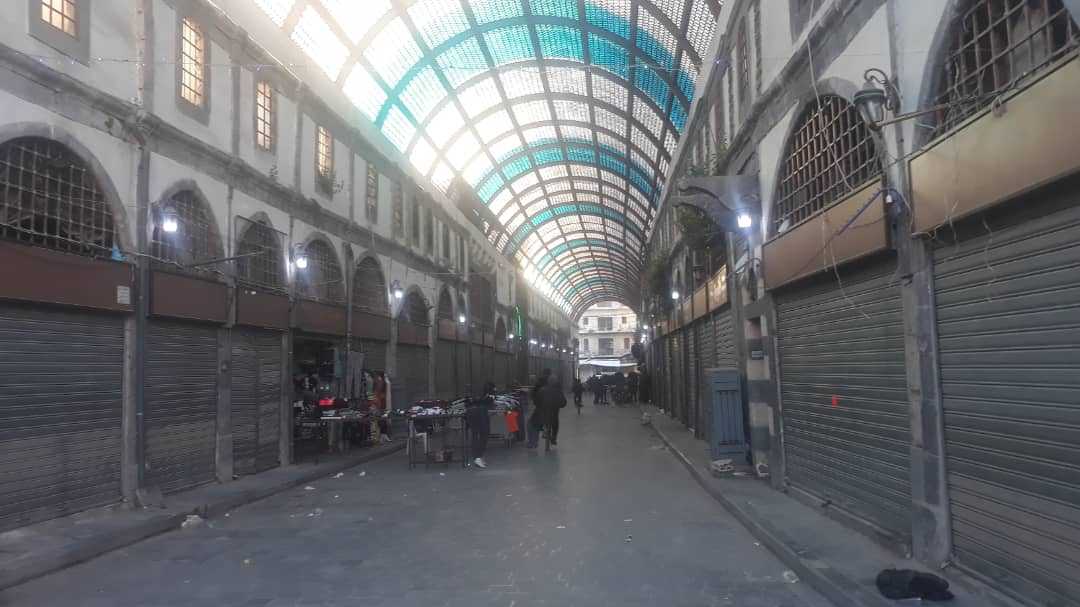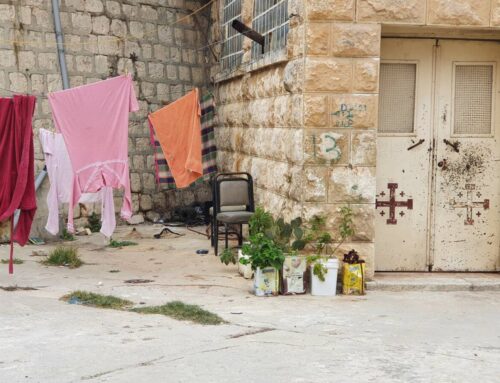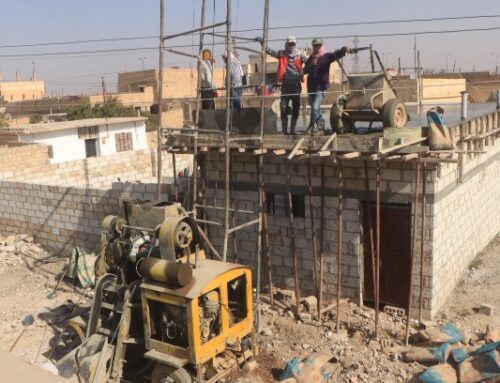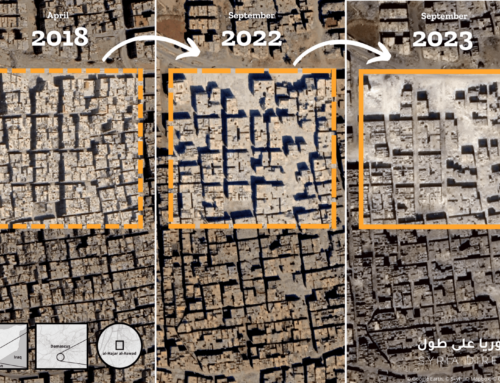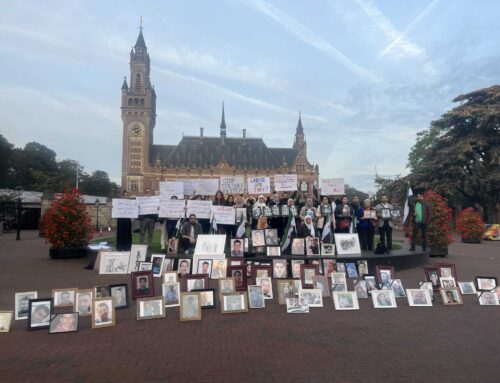Under the pretext of utilization, the regime aims to seize Homs’ old markets
Shop owners in Old Homs are forced to reopen their stores or face legally-baseless seizures by the regime.
18 April 2021
AMMAN — “I want to clean it up and install a door until I have the money to open it,” Abu Ahmad (a pseudonym) said from his shop in the al-Naoura Market in the downtown of Syria’s central city of Homs. At the moment, his priority, he told Syria Direct, is to comply with the orders of the city council.
On November 15, the Homs City Council issued a notice to shopkeepers in the al-Naoura Market to begin to rehabilitate and “re-utilize their shops” within two months “under penalty of legal procedures per the applicable laws and regulations.” Al-Naoura, like many other markets in the old part of Homs, were either destroyed or abandoned as a result of the war.

A copy of the notice issued by the Homs City Council demanding shopkeepers in the al-Naoura Market to rehabilitate and re-utilize their shops within two months (Syria Direct)
The law is the least important
Like many other al-Naoura merchants, Abu Ahmad, 65, did not understand what was meant by “legal procedures.” The phrase is loose and unclear, he said. But according to a source from the Homs Chamber of Commerce quoted by the pro-regime newspaper al-Watan, failure to comply means the city council will reopen the shops in the market.
This forced Abu Ahmad to borrow money from a relative abroad, he said, to pay the initial repair costs of SYP 5 million. But utilizing the shop he owns requires an additional SYP 20 million, while he only has enough money to buy goods for the mobile stall that he and his family currently rely on for a living.
On January 17, the Homs City Council issued a new notice, “based on the petitions of shop owners to be granted additional time,” it stated. While it extended the deadline, the new notice went beyond the al-Naoura Market to apply to all shops and offices of the city center, requiring owners to rehabilitate and utilize them within two months.
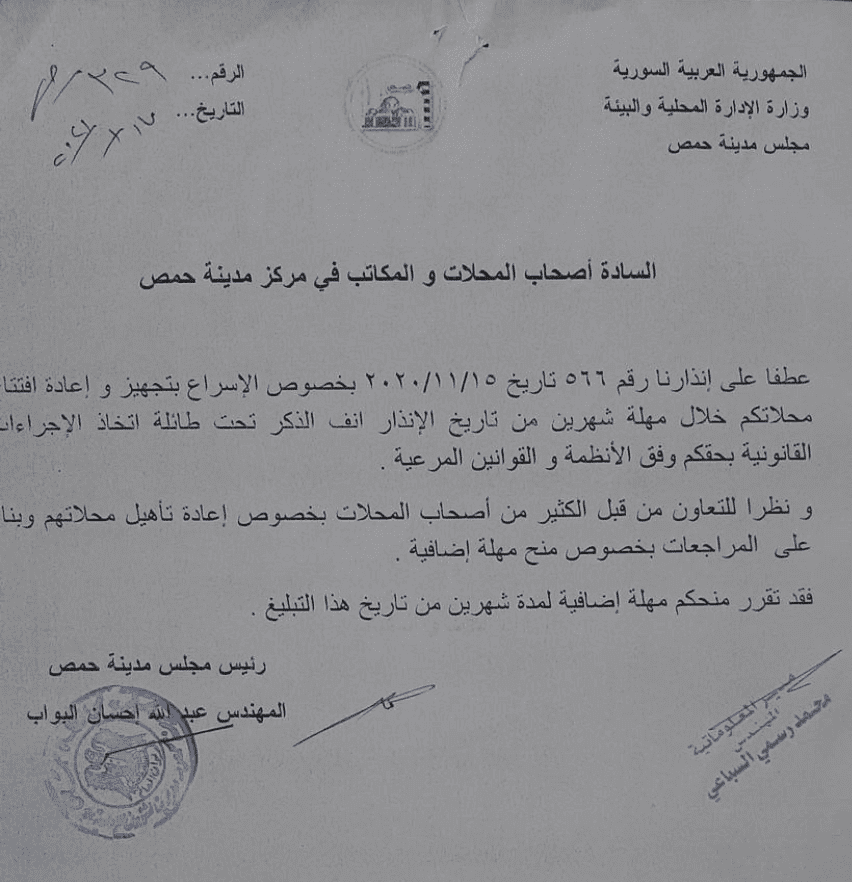
A copy of the second notice issued by the Homs City Council demanding shops and offices in the city center be rehabilitated and utilized within two months (Syria Direct)
According to the city council’s official Facebook page, more than 234 shops were undergoing repairs to be utilized after issuing the notices. But comments by city residents on the page reveal anger at the council resorting to “the language of warnings and threats for traders rather than motivating them with tax breaks, providing electricity and repairing the roads,” a commenter wrote. Another called for “providing cash to a trader before threatening him.”
More importantly, “there is no legal article compelling shop owners to open them, nor can any owner be deprived of his property for not doing so,” according to Muhammad al-Joujah, a Syrian lawyer living in Turkey.
The notices lack any legal basis as long as there are no “executive or legislative decrees including clear legal provisions” authorizing the contents of the warnings, al-Joujah said. He added that they are drafted in an opaque and broad manner to “intimidate and terrorize the citizens in order to activate the city center markets and portray life as having returned to normal in regime-controlled areas, whereas the rents that have accumulated for those who have shops and endowment [properties] must be subject to discussion and negotiation, especially since they have not benefited from [shops and offices] due to the war and they are not ready to receive customers or the traders themselves.”
Circulars and notices on the walls
Five years after moving to the Karm al-Shami neighborhood, 50-year-old Abu Azmi (a pseudonym) has been forced to return to his shop near the Covered Market, even though the area and the roads leading to it are not repaired, and customers are therefore scarce. He returned “so that the local Homs Directorate of Endowments [Awqaf] doesn’t [re-rent] my shop at auction,” he explained to Syria Direct.
By coincidence, Abu Azmi came across a picture posted in a Facebook comment of a circular issued by the Homs Directorate of Endowments. The circular called on tenants of endowment properties in the Covered, al-Hesbah, al-Naoura Markets, as well as the ancient markets, to refer to the directorate and follow up on developments related to stores belonging to it within a maximum period of one month. “This notice serves as a personal notification for every tenant,” it read.
Accordingly, Abu Azmi went to the directorate the next day, where it “demanded five years of accumulated rent for the endowment property my father rented in 1972,” he said. He paid “approximately SYP 250,000 after the directorate refused to negotiate or reduce the amount, even though the shop was closed and I didn’t make even a single pound from it.”
However, Abu Azmi is still luckier than those who did not happen across the circular. “If I hadn’t seen it, the deadline would have gone by, and I would have lost my shop,” he said. “Why are important official notifications not being published on social media pages [belonging to the relevant official entities] or on Syrian state television, for those concerned to see them and act before it is too late?” he asked.
“Neglecting to publish the circulars and notices and just hanging them on the walls and doors of the Directorate of Endowments” serves the goal of the directorate to seize “the endowment properties leased for decades, with legal cover,” by claiming “it gave [the tenants] time, but they did not correct their situation, while the reality is that the circular did not reach them at all,” Abu Azmi suggested.
“[The Directorate of] Endowments seeks to recover its properties from original tenants to raise the rents for new ones so that they would reach SYP 3-4 million a year, rather than approximately SYP 40,000 [at present].”
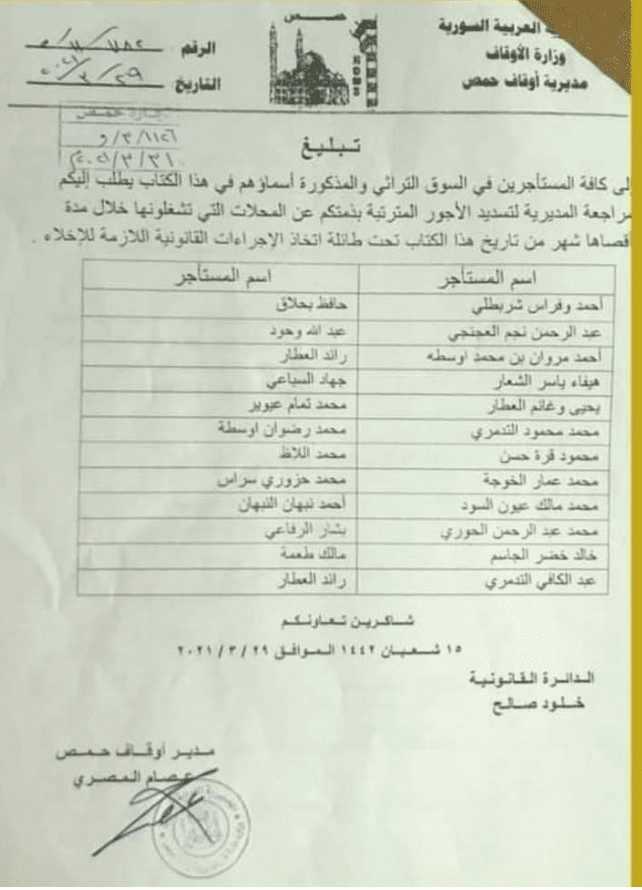
A copy of a notice issued by Homs Directorate of Endowments demanding shop tenants in the Heritage Market to pay accumulated rent within one month (Syria Direct)
A notification was issued by the Directorate of Endowments on March 31 and hung on its door. It demanded 24 tenants in the Heritage Market to “pay the rent due in a maximum period of one month” or else face eviction.
According to Abu Azmi, most of the names mentioned in the circular are likely Syrians living outside the country. They are the most at risk of having their property seized or confiscated, lawyer al-Joujah pointed out, because “it is difficult for them to act on selling, buying and paying off receivables, due to the security approval requirements for procedures related to that, which often obstruct Syrians outside the country—including activists, regime opponents and their relatives.”
This report was originally published in Arabic and translated into English by Mateo Nelson.

